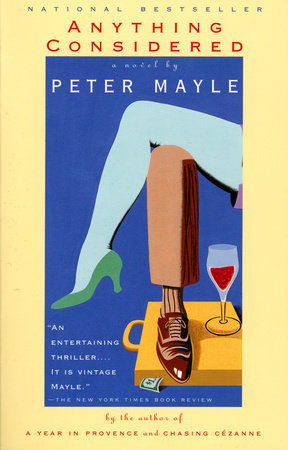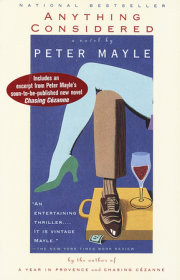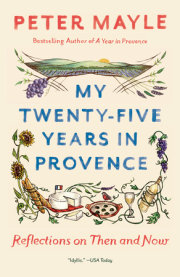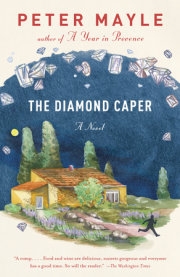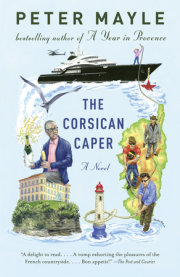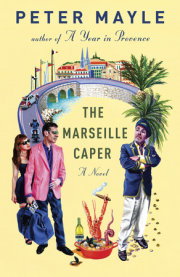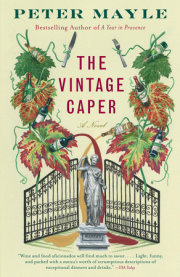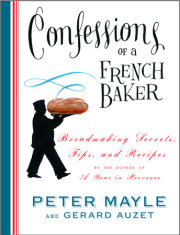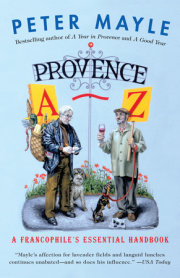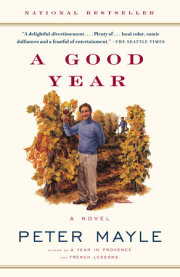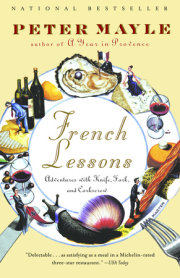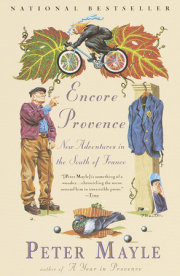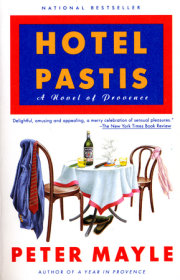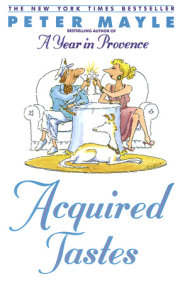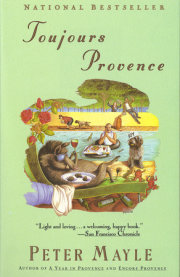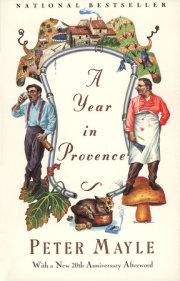The young wild boar, basted until it shone, had been spit-roasted in the kitchen fireplace and was now lying on a wooden platter in the center of the table, a large baked potato in its mouth. Father Gilbert carved, and served chunks of the dark, gamy flesh onto plates of battered pewter, the sleeves of his habit rolled up above his elbows, his face glowing in the candlelight. Glasses were filled, and the fat, round loaves of country bread were sliced thick. The only indications of the twentieth century were the two visitors, in their modern clothes. Everything else, everyone else, could have come from the Middle Ages.
The conversation was mostly of country matters -- the prospects for this year's vintage, the vagaries of the weather, the threat of mildew on the vines, the productivity of the monastery vegetable garden. There were no arguments, no raised voices to disturb the air of contentment that hung over the table. Anna was intrigued. Where had they come from, these men who seemed happy to live in a medieval time warp?
"We are all fugitives from the world of business," said Father Gilbert. "I myself used to work for the Banque Nationale de Paris. Others have come from Elf Aquitaine, IBM, the Bourse, Aerospatiale. We hated corporate life. We loved wine. Fifteen years ago, we pooled our resources and bought the monastery, which had been empty since before the war, and we became monks." He winked at Anna. "Rather informal monks, as you can see."
She was looking puzzled. "Can I ask you a question? Didn't any of you have wives?"
Father Gilbert leaned back in his chair and considered the shadows cast by the candlelight on the vaulted ceiling. "That was another bond we discovered," he said. "The delights of female companionship are not for us. Remind me -- how is that described in your country?"
"Gay?" said Anna.
"Ah, yes. A most inappropriate use of a charming word." He shook his head. "Gay. How ridiculous. I suppose, then, that one could say we are living in a state of perpetual gaiety. That will be a considerable comfort to us all, I'm sure." He laughed and raised his glass to Anna. "Here's to gay days, and many of them."The young wild boar, basted until it shone, had been spit-roasted in the kitchen fireplace and was now lying on a wooden platter in the center of the table, a large baked potato in its mouth. Father Gilbert carved, and served chunks of the dark, gamy flesh onto plates of battered pewter, the sleeves of his habit rolled up above his elbows, his face glowing in the candlelight. Glasses were filled, and the fat, round loaves of country bread were sliced thick. The only indications of the twentieth century were the two visitors, in their modern clothes. Everything else, everyone else, could have come from the Middle Ages.
The conversation was mostly of country matters -- the prospects for this year's vintage, the vagaries of the weather, the threat of mildew on the vines, the productivity of the monastery vegetable garden. There were no arguments, no raised voices to disturb the air of contentment that hung over the table. Anna was intrigued. Where had they come from, these men who seemed happy to live in a medieval time warp?
"We are all fugitives from the world of business," said Father Gilbert. "I myself used to work for the Banque Nationale de Paris. Others have come from Elf Aquitaine, IBM, the Bourse, Aerospatiale. We hated corporate life. We loved wine. Fifteen years ago, we pooled our resources and bought the monastery, which had been empty since before the war, and we became monks." He winked at Anna. "Rather informal monks, as you can see."
She was looking puzzled. "Can I ask you a question? Didn't any of you have wives?"
Father Gilbert leaned back in his chair and considered the shadows cast by the candlelight on the vaulted ceiling. "That was another bond we discovered," he said. "The delights of female companionship are not for us. Remind me -- how is that described in your country?"
"Gay?" said Anna.
"Ah, yes. A most inappropriate use of a charming word." He shook his head. "Gay. How ridiculous. I suppose, then, that one could say we are living in a state of perpetual gaiety. That will be a considerable comfort to us all, I'm sure." He laughed and raised his glass to Anna. "Here's to gay days, and many of them."
. All rights reserved. No part of this excerpt may be reproduced or reprinted without permission in writing from the publisher.

